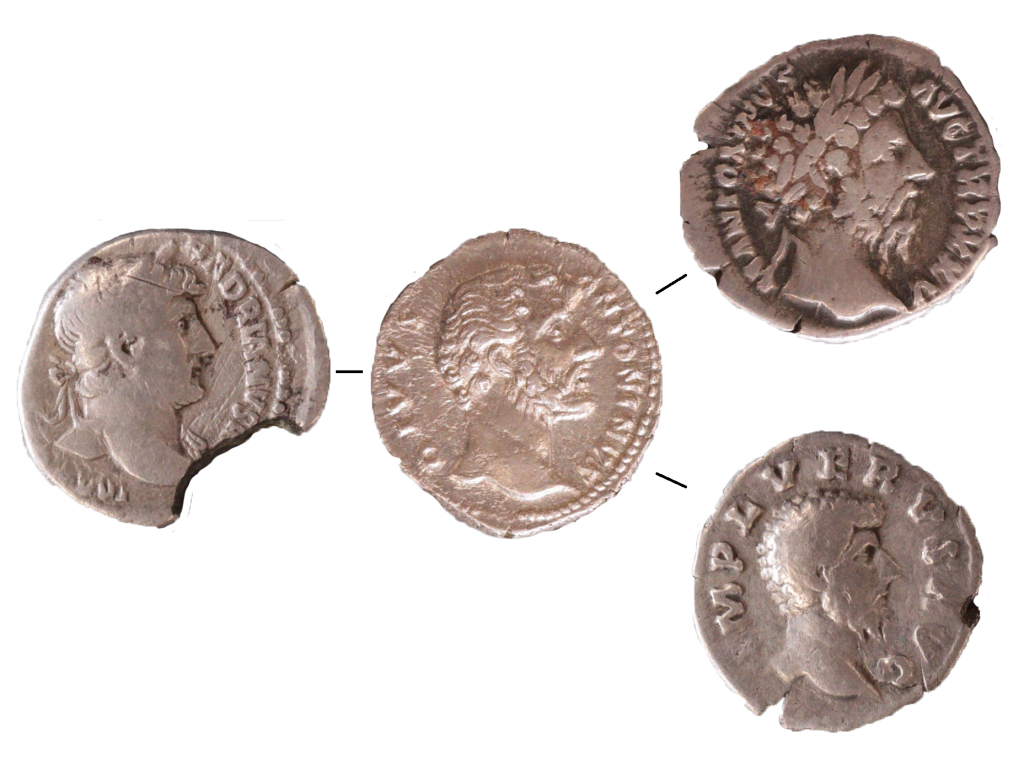February 25, 2015, by Will Leveritt
1877 years ago today: Hadrian adopted Pius on the proviso Pius adopted Marcus Aurelius and Lucius Verus…
Text by Mike Welbourn
Image by Kelly Grimshaw
Emperor Trajan, or Imperator Caesar Nerva Traianus Divi Nervae filius Augustus, was born on September 18th AD 56 to Marcia and Marcus
Today marks the anniversary of the adoption of Antoninus Pius by the emperor Hadrian, on condition that Pius adopted both Marcus Aurelius and Lucius Verus.
Late in his reign, around AD 136, Hadrian fell ill. His deteriorating health evidently brought home to him the importance of organizing his succession, something he seems to have neglected up until then. He first considered his brother-in-law, Gaius Julius Servilius Ursus Servianus, a distinguished and influential senator who over the course of his career had received the exceptional honour of three consulships (two under Trajan, the third in 134 under Hadrian). Moreover, he began to groom Servianus’ grandson, Gnaeus Pedanius Fuscus Salinator, as his grandfather’s successor in turn. Hadrian thus demonstrated already the concern for planning several successions in advance, which we shall see in relation to Antoninus Pius’ own adoption.

Denarii of four emperors. Left to Right: Hadrian, Antoninus Pius, Marcus Aurelius (above) and Lucius Verus (below).
However, for reasons which are not made entirely clear in our sources, Hadrian decided against this plan. Perhaps it was Servianus’ advanced age (he was 90 in 136); or perhaps it was Salinator’s eagerness to be emperor, an eagerness apparently increased by prophecies and omens predicting such a fate for him. Hadrian may well have found such overweening ambition distasteful, or felt it tended too close to wishing for his own swift demise.
To this we might add the increasing bitterness and suspiciousness which seems to have characterized the final two years of Hadrian’s reign (symptoms of his ongoing illness?). All of this led the emperor finally to adopt as his heir one Lucius Ceionius Commodus – a senator like Servianus, and from a reasonably distinguished family – and secondly to force both Servianus and Salinator to commit suicide, when their opinions about his change of heart became known.
Commodus became Lucius Aelius Caesar (Aelius had been Hadrian’s family name until his own adoption by Trajan), was made consul for 137, and was sent to the Danube frontier to gain valuable military experience. Unfortunately for Hadrian, Aelius suffered from an illness (perhaps tuberculosis) and died on 1 January 138, aged just 36.
It was at this point that Hadrian settled on another prominent senator, Titus Aurelius Fulvus Boionius Arrius Antoninus, the future emperor Antoninus Pius. Antoninus had enjoyed a respectable, if unremarkable, senatorial career and was well thought of by his peers, and by Hadrian himself. He was officially adopted by Hadrian on this day, 25 February in 138, becoming Titus Aelius Caesar Antoninus.
But, as with Servianus and Salinator, Hadrian wished to plan much further in advance. As such, he agreed to adopt Antoninus only on condition that Antoninus in turn adopt two further young men. One of these was the seventeen-year old Marcus Annius Verus, grandson of a very distinguished senator of the same name. He, like Servianus had been consul three times (in 97, 121, and 126). As well as his impressive lineage, the young man seems to have been a favourite of Hadrian’s from an early age, and had a familial connection to Antoninus, whose wife Faustina the Elder was his aunt.
The other boy was the seven-year old Lucius Ceionius Commodus, the son of Aelius Caesar. These two young men would eventually go on to rule together as Lucius Verus and Marcus Aurelius. Thus Hadrian had organized several successions at once.
Why he chose this particular arrangement is an open and controversial question, with several possible answers. Whatever may have been Hadrian’s precise objective, when he died in July of 138 he could do so knowing he had secured the smooth transition of power, not only from himself to Antoninus, but beyond.
Some key ancient sources on this subject:
- Cassius Dio, Roman History, Book 69.17-21.
- Historia Augusta, Life of Hadrian 15.8 and 23-24.7; Life of Antoninus 4.1-7; Life of Marcus Aurelius 5.1-6; Life of Verus 2.1-4.
- Aurelius Victor, Epitome de Caesaribus, 15.2 and 16.5.
No comments yet, fill out a comment to be the first

Leave a Reply